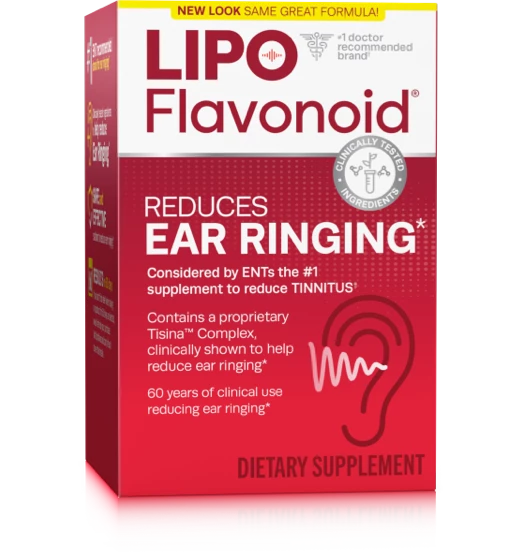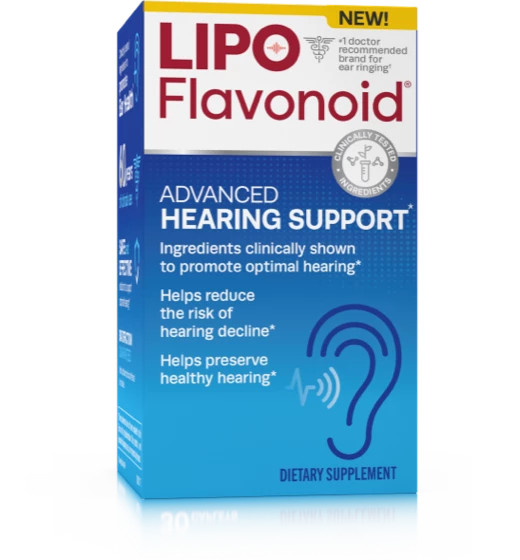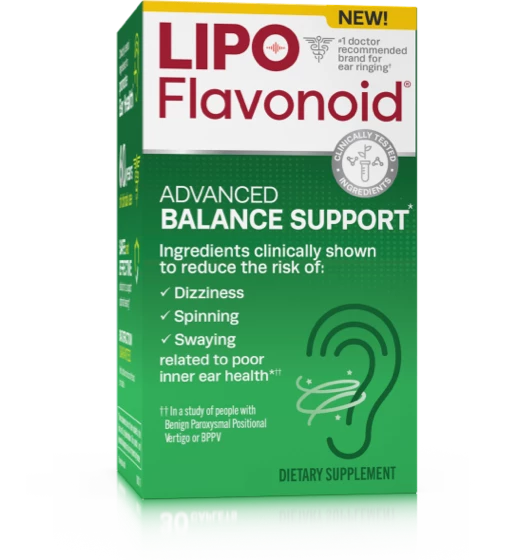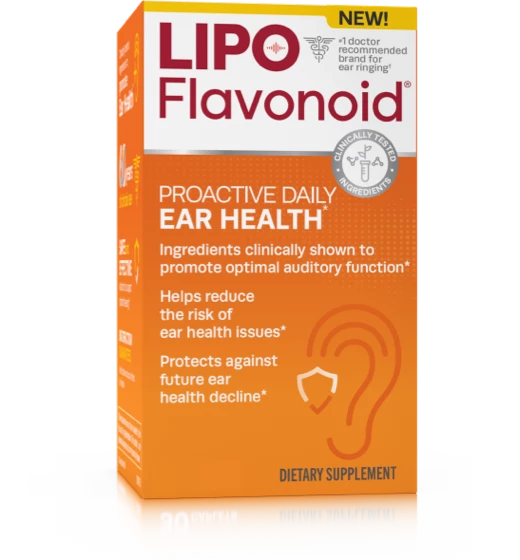- Products
- Science
-
Resources
- Tinnitus Resources
- What is tinnitus?
- Causes of tinnitus
- Tips for managing tinnitus
- Prepare for your doctor's visit
- PTSD and tinnitus
- Tinnitus FAQs
- Hearing Loss Resources
- What is hearing loss?
- Degrees of hearing Impairment
- Types of hearing loss
- Causes of hearing loss
- Treatment options for hearing loss
- Buy Now
- Coupons
- Test Your Hearing
- Test Your Hearing
- Healthcare Professionals
Daily Supplement for Vertigo with Dr. Tonia Farmer and WebMD
Dr. Tonia Farmer explains that vertigo symptoms like dizziness and swaying can result from inner ear issues and nutrient deficiencies, highlighting the importance of nutrition and suggesting the use of Lipo Flavonoid Advanced Balance Support with Ginkgo Biloba and Vitamin D to reduce the risk of vertigo.
According to WebMD, More than 36 million people (65% of people in the U.S. aged 60 or older) experience dizziness or loss of balance, often daily. They said benign paroxysmal positional vertigo (BPPV) affects the inner ear structures that help us balance. BPPV affects at least 9% of adults aged 18 to 352 and worsens with age because as we get older, the delicate structures of our inner ear decline.
Dr. Tonia Farmer, board-certified otolaryngologist says balance issues and bouts of dizziness, swaying, and spinning are common symptoms of vertigo.
She says these issues are often caused by an age-related decline of inner ear structures and can worsen due to nutrient deficiency.
She recommends that patients struggling with chronic balance issues due to inner ear health should consider a daily supplement like Lipo Flavonoid’s Advanced Balance Support.
“It’s formulated with key ear health nutrients like Ginkgo Biloba and Vitamin D, which are clinically shown to help reduce the risk of vertigo-like symptoms such as dizziness, spinning, and swaying,”
says Dr. Farmer.
You can find Lipo Flavonoid Advance Balance Support at major retailers and on Amazon. See all stores here.
*These statements have not been evaluated by the Food and Drug Administration. These products are not intended to diagnose, treat, cure or prevent any disease.
*Survey data on file
REFERENCES:
- April 2018 Survey. Clarion Brands Inc. data on file.
- Williams H, Hedgecock L. Citrus Bioflavonoids, Ascorbic Acid and Other B-vitamins in the Treatment of certain types of neurosensory deafness a preliminary report. Staff meeting of the Mayo Clinic (1962).
- Tinnitus Overview. Mayo Clinic website http://www.mayoclinic.org/diseases-conditions/tinnitus/basics/definition/con-20021487. Accessed Sept. 7, 2016.
- Understanding the Facts. American Tinnitus Associations website https://www.ata.org/understanding-facts. Accessed Sept. 7, 2016.
- Slattery WH, Fayad JN. Medical treatment of Meniere's disease. Otolaryngologic Clinics of North America 1997; 30:1027-37.
- Kumar S, Pandey AK. Chemistry and Biological Activities of Flavonoids: An Overview. The Scientific World Journal. 2013;2013:162750. doi:10.1155/2013/162750.
- Fetterman BL, Saunders JE, Luxford WM. Prognosis and treatment of sudden sensorineural hearing loss. Am J Otol 1996; 17:529-36.
- Arenberg I, Bayer R. Therapeutic Options in Meniere’s Disease. Arch Otolaryngol 1977;103: 589-93.
- Shaia F, Sheehy J. Sudden sensori-neural hearing impairment: a report of 1,220 cases. Laryngoscope 1976; 86:389-98.
- Herschberg S. Meniere’s disease. J Am Osteopathic Association 1974; 73:540-6.
- Wolfson R. Treatment of Meniere’s disease. Modern Treatment (1969) 6,3, 553-567.
- Rubin W. Vestibular suppressant drugs. Arch Otolaryngol 1973; 97:135-8




